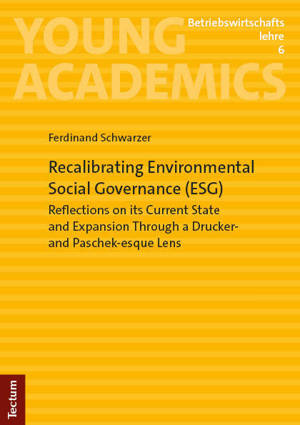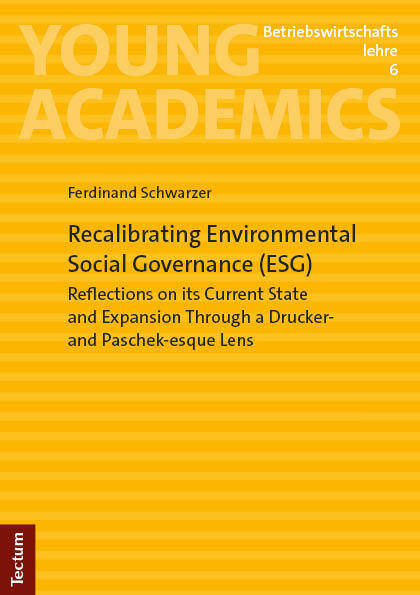
- Afhalen na 1 uur in een winkel met voorraad
- Gratis thuislevering in België vanaf € 30
- Ruim aanbod met 7 miljoen producten
- Afhalen na 1 uur in een winkel met voorraad
- Gratis thuislevering in België vanaf € 30
- Ruim aanbod met 7 miljoen producten
Zoeken
Recalibrating Environmental Social Governance (Esg)
Reflections on Its Current State and Expansion Through a Drucker- And Paschek-Esque Lens
Ferdinand Schwarzer
€ 49,95
+ 99 punten
Omschrijving
ESG swiftly transitioned from a financial niche to a topic of public discourse, but recent disillusionment has challenged its transformative potential for developing sustainable societies. This thesis seeks to recalibrate ESG in terms of its effectiveness over its efficiency. Exploring ESG's history, ecosystem and diverse perspectives, the study conceptually expands each pillar through Gen Z's societal roles and both Peter Drucker's and Peter Paschek's insights into the social responsibility of businesses and the requirements for a 'bearable society'. The author's quantitative and qualitative analysis reveals that expanding ESG could be promising for every company, with the caveat that it will also lead to (only initial) discomfort for society's major leadership groups.
Specificaties
Betrokkenen
- Auteur(s):
- Uitgeverij:
Inhoud
- Aantal bladzijden:
- 194
- Taal:
- Engels
- Reeks:
- Reeksnummer:
- nr. 6
Eigenschappen
- Productcode (EAN):
- 9783828851825
- Verschijningsdatum:
- 5/04/2024
- Uitvoering:
- Paperback
- Formaat:
- Trade paperback (VS)
- Afmetingen:
- 147 mm x 211 mm
- Gewicht:
- 539 g

Alleen bij Standaard Boekhandel
+ 99 punten op je klantenkaart van Standaard Boekhandel
Beoordelingen
We publiceren alleen reviews die voldoen aan de voorwaarden voor reviews. Bekijk onze voorwaarden voor reviews.











